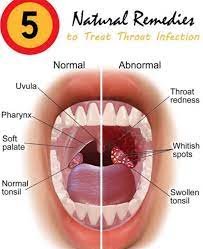Throat Infection
A Throat infection, also known as pharyngitis, refers to inflammation of the throat, specifically the pharynx. The pharynx is the part of the throat situated behind the mouth and nasal cavity, and it serves as a passage for both air and food. Throat infections can be caused by various factors, including viral or bacterial infections, as well as irritants.

-
Viral Infections:
- The majority of throat infections are caused by viruses, such as the common cold viruses, influenza viruses, or the Epstein-Barr virus (which causes infectious mononucleosis or "mono").
- Viral throat infections are usually self-limiting and do not require antibiotics.
-
Bacterial Infections:
- Streptococcus bacteria, particularly Group A Streptococcus (Strep throat), are common bacterial causes of throat infections.
- Bacterial infections may require antibiotics for treatment.
-
Irritants:
- Exposure to irritants, such as smoke, pollutants, or dry air, can lead to throat irritation and inflammation.
Symptoms:
-
Sore Throat:
- Pain or discomfort in the throat is a common symptom.
-
Difficulty Swallowing:
- Swallowing may be painful or difficult.
-
Redness and Swelling:
- The throat may appear red and swollen.
-
Fever:
- Throat infections, especially those caused by bacteria, may be accompanied by fever.
-
Cough:
- A dry or productive cough can be present.
-
Hoarseness:
- The voice may become hoarse or raspy.
-
Runny Nose:
- If the infection is viral, symptoms like a runny or stuffy nose may be present.
Treatment:
-
Viral Infections:
- Rest, hydration, and over-the-counter pain relievers (like acetaminophen or ibuprofen) are often recommended.
- Antiviral medications may be prescribed for specific viral infections.
-
Bacterial Infections:
- Antibiotics, such as penicillin or amoxicillin, are typically prescribed for bacterial infections like strep throat.
- It's important to complete the full course of antibiotics even if symptoms improve to prevent recurrence or complications.
-
Symptomatic Relief:
- Throat lozenges, warm saltwater gargles, and throat sprays may provide relief from throat pain.
- Humidifying the air and staying hydrated can also help.
-
Rest and Fluids:
- Getting plenty of rest and staying well-hydrated are important for recovery.
Home remedies can be effective in providing relief from the symptoms of a throat infection. While these remedies may not cure the underlying infection, they can help alleviate discomfort and support the body's natural healing process. Here are some common home remedies for a throat infection:
-
Warm Saltwater Gargle:
- Gargling with warm saltwater can help soothe a sore throat and reduce inflammation. Mix a teaspoon of salt in a glass of warm water and gargle several times a day.
-
Hydration:
- Staying well-hydrated is important for throat health. Drink plenty of water, herbal teas, or clear broths to keep the throat moist and to help soothe irritation.
-
Throat Lozenges or Hard Candy:
- Sucking on throat lozenges or hard candy can temporarily relieve throat pain and stimulate saliva production, which helps keep the throat moist.
-
Honey and Warm Water:
- Adding honey to warm water or tea can provide soothing relief for a sore throat. Honey has natural antibacterial properties and can help coat the throat.
-
Humidifier:
- Using a humidifier in your room can add moisture to the air, preventing the throat from drying out. This is particularly helpful in dry or cold environments.
-
Rest:
- Getting plenty of rest allows your body to focus on healing. Adequate rest supports the immune system and helps expedite recovery.
-
Steam Inhalation:
- Inhaling steam can help relieve congestion and soothe the throat. You can use a bowl of hot water, cover your head with a towel, and breathe in the steam.
-
Ginger Tea:
- Ginger has anti-inflammatory properties and can be soothing for a sore throat. Make a ginger tea by boiling fresh ginger slices in water. You can add honey for sweetness.
-
Apple Cider Vinegar:
- Gargling with a mixture of warm water and apple cider vinegar may help create an acidic environment that is unfriendly to bacteria. Be sure to dilute the vinegar and not use it excessively.
-
Warm Broth:
- Sipping on warm broth, such as chicken soup, can provide hydration and nourishment. The warmth can also be soothing to the throat.
-
Avoid Irritants:
- Avoid smoking and exposure to secondhand smoke. Additionally, limit your intake of alcohol and caffeine, as these can contribute to dehydration.
When to Seek Medical Attention:
- If symptoms persist or worsen after a few days.
- If there is severe throat pain, difficulty breathing, or difficulty swallowing.
- If a persistent fever is present.
- If there is suspicion of a bacterial infection, especially strep throat.
What's Your Reaction?















